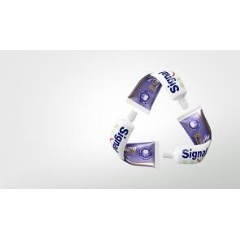Brush, rinse, recycle
From recyclable toothpaste tubes and eco-friendly toothbrushes to boxless packaging and naturally derived ingredient lists, our oral care brands are on a mission to put planet-friendly innovation at the heart of their operations
Most of us start and end our day by brushing our teeth. But few of us consider what happens to our toothpaste tube once it’s been squeezed out.
The truth is that the ubiquitous toothpaste tube is a significant contributor to the planet’s plastic crisis. Made from a combination of plastic and aluminium, the tubes have always been notoriously difficult to recycle – resulting in billions of tubes being thrown into landfills around the globe every year.
But all that is about to change.
By 2025 Unilever plans to shift its full oral care portfolio, including Close Up, Pepsodent and Signal, to new recyclable tubes. The move means over 12,000 tonnes of plastic will become recyclable, which is enough plastic to circle the Earth 11 times.1
There is a growing appetite for sustainable toothbrushes and toothpaste, according to our Consumer Market Insights (CMI) research. Over the past five years, there has been an eleven-fold increase in the number of monthly searches of the most searched sustainable oral care products. This is an area of growth potential, as consumer awareness grows and we move to more recyclable material.
Responding to the pollution challenge
“Plastic pollution is undoubtably one of the biggest environmental challenges of our time. We can see its impact on our planet every day, including the billions of toothpaste tubes dumped into landfills every year,” says Samir Singh, Executive Vice President, Global Skin Cleansing and Oral Care. “That’s why I’m proud of this latest packaging innovation which will see our entire toothpaste portfolio shift to recyclable tubes.”
Starting with Signal in France this September, the new tubes will be made with high-density polyethylene (HDPE), one of the most recyclable plastics in the world, instead of aluminium. And, as HDPE is also one of the thinnest plastics available in the toothpaste market, less plastic will be needed for each tube.
“Recyclable tubes mark a key milestone in our packaging journey and, more significantly, they have the potential to transform the whole oral care industry,” says Babu Cherian, R&D Oral Care Packaging Director at Unilever. “Together with our manufacturing partners, we’re making the new design available to any producers interested in adopting the new material, with the ambition to accelerate industry change.”
Contributing to Unilever’s broader commitment of making 100% of its packaging reusable, recyclable or compostable by 2025, this innovation also responds to a growing consumer demand for planet-friendly yet high-performing oral care products.
But this is just the beginning. Here are three other recent innovations from our oral care brands.
1. Binning the boxes
In many countries, toothpastes are sold in cardboard boxes that help protect the tubes. Although useful, they are a massive source of waste, with hundreds of millions of boxes binned every year.
Now Zendium, whose environmental credentials include PETA certification, have found a way to go ‘naked’ thanks to a recyclable ready-for-shelf tray which can store tubes vertically. “People are increasingly questioning the use of packaging. We hope this move will inspire a new industry trend which will help reduce waste and save millions of tonnes of cardboard every year,” says Pau Bartoli, Brand Director for Zendium.
The brand estimates that binning the boxes will save over 2,500 trees every year, while savings made from the removal of the cardboard box have enabled the brand to invest in more sustainable packaging for its entire range, including plant-based plastic tubes.
2. New generation toothbrushes
Over the years Signal has introduced several eco-friendly brushes to its range, including a bamboo toothbrush. However, its new Switch brush offers a completely new approach to sustainable oral care. Thanks to its long-lasting metal handle, it is only the brush’s head that needs to be changed, which could help reduce consumers’ virgin plastic use by 95%.
“We know people are increasingly looking for products that fit with a more sustainable lifestyle but still deliver on efficacy and design,” says Leila Esmaeili, Global Brand Engagement Manager. “Signal Switch has been developed to meet those needs and appeal to a wide range of audiences and age groups. It’s an important, sustainable addition to our portfolio.”
3. Eco-friendly ingredients
Our brands are working to ensure their ingredient lists reflect both their commitment to the planet and to performance. Signal’s new White Now Detox environmentally conscious formula contains 94% ingredients from a natural origin, including mineral clay and activated charcoal to cleanse and lift stains. Boosted with White Now’s White-Correct technology,* it has been proven to brighten teeth by up to three shades instantly. With this new range also saying goodbye to its cardboard box, Signal White Now is ticking all the right boxes when it comes to sustainability.
1 Calculation based on lining up 75ml toothpaste tubes end to end.
* The instant and optical effect is temporary.
-----
https://www.youtube.com/watch?v=AzyzcFO0Uws
( Press Release Image: https://photos.webwire.com/prmedia/6/276369/276369-1.jpg )
WebWireID276369
This news content was configured by WebWire editorial staff. Linking is permitted.
News Release Distribution and Press Release Distribution Services Provided by WebWire.

